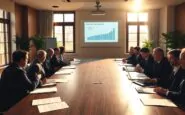Argomenti trattati
In a pivotal meeting held on Monday, energy ministers from the European Union reached a consensus to phase out the remaining gas imports from Russia by the conclusion of 2027. This decision marks a significant step in the EU’s ongoing efforts to reduce its dependency on Russian energy supplies, a challenge that has intensified since the onset of the Ukraine conflict.
Key components of the agreement
The newly proposed regulations, which are anticipated to gain support from the European Parliament, include a prohibition on new contracts for Russian gas imports starting on January 1, 2026. This measure aims to halt future dependencies while allowing for a gradual phase-out of existing commitments.
Transition periods for existing contracts
For contracts currently in place, a transition period will be implemented. Short-term contracts will continue until June 17 of the coming year, while long-term agreements will be permitted to remain active until January 1, 2028. Despite the planned phase-out, Russian gas still constitutes approximately 13% of the EU’s total imports in 2025, equating to over €15 billion (about $15.15 billion) annually, as reported by Brussels.
Member states and their positions
Hungary and Slovakia emerge as the leading buyers of Russian pipeline gas and crude oil within the EU framework. In contrast, France, the Netherlands, and Belgium are the top consumers of Russian liquefied natural gas (LNG). The approved EU Council text includes specific provisions to accommodate landlocked member states like Hungary and Slovakia, which expressed reservations regarding the gas import ban.
Negotiations and parliamentary approval
The ministers convened in Luxembourg to endorse the European Commission’s strategy aimed at phasing out both pipeline gas and LNG imports from Russia. This plan will now be subject to the European Parliament’s approval. Notably, the Commission has made allowances for Hungary and Slovakia—nations that maintain closer diplomatic ties with Russia—allowing the proposal to move forward without necessitating unanimous consent from all member states.
The broader strategy for energy independence
The Council presidency, held by Denmark, is set to initiate discussions with the European Parliament to finalize the regulatory text once the Parliament has established its position. The objective is to reach a conclusive agreement by the end of 2025, as highlighted by Bloomberg.
This initiative is part of a larger strategy devised by the EU to reduce reliance on energy resources from Russia. Concurrently, the European Commission is advocating for a one-year acceleration in the phase-out of LNG imports, targeting January 2027 as the new deadline. This is an element of a fresh sanctions package aimed at undermining Moscow’s financial capabilities linked to the ongoing conflict.
Challenges in implementing sanctions
It is important to note that sanctions require unanimous support from all 27 EU nations, which has proven to be a challenging task at times. The EU’s foreign policy chief, Kaja Kallas, indicated that the 19th sanctions package, which encompasses a ban on Russian LNG imports effective from January 1, 2027, could potentially receive approval as early as this week.

